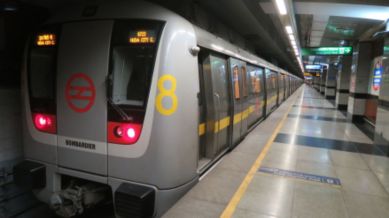Stay updated with the latest - Click here to follow us on Instagram
Delhi Metro hikes fare after gap of 8 years amid ‘financial strain’
Delhi Metro said the fare revision is a minimal adjustment, applicable to both regular days and Sundays or national holidays.

After a gap of eight years, the Delhi Metro Rail Corporation (DMRC) on Monday revised fare for one of the Capital’s most preferred modes of public transportation, with an average daily ridership of approximately 65 lakh passengers.
The hike ranges between Re 1 and Rs 5 per passenger, depending on the Metro line and distance (see box).
monthly limit of free stories.
with an Express account.
Labelled ‘minimal’, the revision has been made because the “financial condition of the corporation was in considerable strain,” according to officials.
Before Monday, the fare ranged between Rs 10 and Rs 60. After the increase, metro fare range from Rs 11 to Rs 64. Fare on the Airport Express Line have gone up by up to Rs 5.
The revision also applies to Sundays and national holidays.
In the absence of hikes over the last eight years, the financial condition of the DMRC was in considerable strain, according to officials. “In the last few years, DMRC has been facing considerable financial challenges. The losses incurred during the Covid period and the loan repayment commitments to Japan International Cooperation Agency (JICA) have posed a grave challenge to DMRC’s resources. The need for midlife refurbishment of the Delhi Metro trains, civil assets, and machinery, the expenditure on general upkeep of the network, and salaries to the human resources have also continued during this period,” the DMRC spokesperson said.
The corporation incurred a loss before tax amounting to Rs 1,781.69 crore in the financial year 2023-24. In the subsequent year (2024-25), the losses are likely to be Rs 1,598 crore (unaudited), the spokesperson said, adding, “This minimal increase in fare will only marginally alleviate the losses being suffered by DMRC. This additional revenue will just help DMRC maintain its world-class operational standards by ensuring the timely upkeep of its trains and other infrastructure, which is now aging.”
Delhi metro’s fare can only be revised by an independent Fare Fixation Committee constituted by the Ministry of Housing and Urban Affairs (MoHUA). The 4th Fare Fixation Committee (FFC), which submitted its report in 2016, had recommended an annual increase after 2019, which had not been implemented, until now. “This revision has now been done in line with the statutory provisions and recommendations of the 4th FFC, as per a decision taken by the Board of Directors of DMRC,” the spokesperson said.
The 4th FFC was constituted in 2016 by the Ministry of Urban Development (renamed Ministry of Housing and Urban Affairs later). The Committee, which submitted its report in September 2016, was led by ML Mehta, retired Delhi High Court judge; SD Mishra, Additional Secretary, Urban Development, Ministry of Urban Development and KK Sharma, Chief Secretary, Delhi Government.
The fare hike in 2017, which took place in two phases in 2017, was quite steep — minimum and maximum fares went from Rs 8 and Rs 30 to Rs 10 and Rs 60.
The move had faced stiff opposition from the then Aam Aadmi Party (AAP) government. The Delhi Transport department wrote to DMRC MD opposing the move before the recommendation, and CM Arvind Kejriwal, asking the DMRC to put on hold the hike, calling it “unbearable for the common man”.
The FFC followed two principles while revising the fare: affordability of fare by passengers and financial sustainability of the metro system.
The Committee also recommended that an “automatic annual fare revision formula be implemented with effect from January 1, 2019 and will continue till next FFC”. The yearly increase will take place according to a formula which takes into account energy, staff costs and maintenance costs, or a 7% increase per year, whichever is lower.
“The DMRC did not implement this yearly increase because of the Covid pandemic in which normal services were not available besides dip in ridership due to restrictions. Things have started normalising from 2024 onwards and accordingly, to cater to the present day requirements, the fare has been revised minimally,” the spokesperson also said.
If the 7% increase would have taken place, a fare of Rs 40 would have become Rs 60 by 2025, and a fare of Rs 50 would have risen to Rs 75.